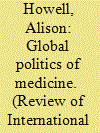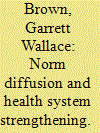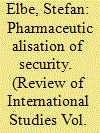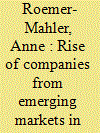|
|
|
Sort Order |
|
|
|
Items / Page
|
|
|
|
|
|
|
| Srl | Item |
| 1 |
ID:
141065


|
|
|
|
|
| Summary/Abstract |
This article makes the case for a new field in International Relations (IR): the Global Politics of Medicine. It argues that significant avenues of research can be opened up by focusing on medicine and the life sciences, in order to both challenge current IR theories, and develop new theoretical and empirical insights in IR. In particular, the article challenges the validity of securitisation theory, and specifically the argument that health has been securitised. Showing instead that medicine and warfare have been imbricated from the nineteenth century as strategies of population, it challenges securitisation theory's ahistoricism and its assumption that social security and international security (and the norm/exception) are analytically divisible. Bringing this into the present through the examples of triage, psychological resilience, and genetic intelligence in counterinsurgency, it traces how warfare and medicine now ambitiously seek to treat populations as sets of individual bodies. Arguing that we cannot retreat to some mythical state of politics ‘prior’ to securitisation, it draws out how the fields of war, health, and medicine are nonetheless highly contested. The article concludes by challenging the fields of Global Health, war, and security studies, but also suggests novel routes for pursuing the study of the Global Politics of Medicine.
|
|
|
|
|
|
|
|
|
|
|
|
|
|
|
|
| 2 |
ID:
141059


|
|
|
|
|
| Summary/Abstract |
Ideas of smart power and Global Health Diplomacy have developed considerable prominence over the past decade in, respectively, the foreign policy and public health communities. Although in some respects separate, both suggest the potential for using health assistance to generate political as well as health benefits. The conflicts in Iraq and Afghanistan provide an opportunity to examine these assertions at the ‘sharp end’. We consider both the health and wider strategic benefits of health assistance in these conflicts, as well as some of the ethical challenges involved. We conclude however that we should adopt the precautionary principle because: there is doubt over the quality of health services provided in such circumstances; concern over the wider effects of politicising health aid; and little proof that the claimed strategic benefits materialise in practice.
|
|
|
|
|
|
|
|
|
|
|
|
|
|
|
|
| 3 |
ID:
141060


|
|
|
|
|
| Summary/Abstract |
Over the past decade, there have been increased attempts to understand the contributing factors to the relationship between healthy populations (that is, populations that have long life expectancy from birth), the prevention of conflict, and governance regimes that enable ‘healthy nations’ to survive and thrive. These studies have been largely informed by longitudinal studies on the positive relationship between regime type, provision of health care, and conflict prevention. This article examines what insights a comparison of postconflict countries in a regional setting may provide to challenge or indeed extend the findings advanced so far in the literature on the relationship between regime type and health insecurity. The Southeast Asian experience confirms the obvious – that the cessation of armed conflict is related to improved health outcomes. However, it challenges presumptions that democratisation plays a significant role in shaping this relationship.
|
|
|
|
|
|
|
|
|
|
|
|
|
|
|
|
| 4 |
ID:
141061


|
|
|
|
|
| Summary/Abstract |
Academics and policymakers often argue that global health policy greatly affects and influences national health systems because these policies transfer and implant ‘best practice’ norms and accountability techniques into local health systems. On the whole these arguments about the ‘diffusion of norms’ have merit since there is considerable evidence to suggest the existence of a positive correlation between global norms and national behaviour. Nevertheless, this article argues that traditional analytical frameworks to explain norm diffusion underplay the fact that norms are significantly ‘glocalised’ by national actors and further discount the role that national leadership plays in strengthening health systems. In response, this article presents a ten-year comparative paired study of the participatory governance mechanisms of the South African health system and its health strengthening measures. In doing so, the role of the national government in their relations with the Global Fund to Fight AIDS, Tuberculosis, and Malaria (GFATM) will be examined and how key ‘partnership’ norms were amalgamated into health governance mechanisms. It will be argued that although global policy plays an important guiding role, health norms are never transcribed straightforwardly and a central element to successful health governance remains vested in the nation and the leadership role it exerts.
|
|
|
|
|
|
|
|
|
|
|
|
|
|
|
|
| 5 |
ID:
141063


|
|
|
|
|
| Summary/Abstract |
Pharmaceuticals are now critical to the security of populations. Antivirals, antibiotics, next-generation vaccines, and antitoxins are just some of the new ‘medical countermeasures’ that governments are stockpiling in order to defend their populations against the threat of pandemics and bioterrorism. How has security policy come to be so deeply imbricated with pharmaceutical logics and solutions? This article captures, maps, and analyses the ‘pharmaceuticalisation’ of security. Through an in-depth analysis of the prominent antiviral medication Tamiflu, it shows that this pharmaceutical turn in security policy is intimately bound up with the rise of a molecular vision of life promulgated by the biomedical sciences. Caught in the crosshairs of powerful commercial, political, and regulatory pressures, governments are embracing a molecular biomedicine promising to secure populations pharmaceutically in the twenty-first century. If that is true, then the established disciplinary view of health as a predominantly secondary matter of ‘low’ international politics is mistaken. On the contrary, the social forces of health and biomedicine are powerful enough to influence the core practices of international politics – even those of security. For a discipline long accustomed to studying macrolevel processes and systemic structures, it is in the end also our knowledge of the minute morass of molecules that shapes international relations.
|
|
|
|
|
|
|
|
|
|
|
|
|
|
|
|
| 6 |
ID:
141064


|
|
|
|
|
| Summary/Abstract |
It has become common to speak of health security, but the meaning of the latter is often taken for granted. Existing engagements with this notion have been constrained by an excessive focus on national security and on the securitising efforts of elites. This has led to an increasingly sceptical outlook on the potentialities of security for making sense of, and helping to tackle, health problems. Inspired by the idea of security as emancipation, this article reconsiders the notion of health security. It takes as its starting point the concrete insecurities experienced by individuals, and engages with them by way of an analytical framework centred on the notion of domination. Domination deepens analysis by connecting individual experiences of insecurity, the social interactions through which these are given meaning, and the structures that make them possible. Domination also broadens the remit of analysis, shedding light on the multifaceted nature of insecurity. The analytical benefits of this framework are demonstrated by two examples: HIV/AIDS; and water and sanitation. The lens of domination is also shown to bring benefits for the political engagement with global health problems.
|
|
|
|
|
|
|
|
|
|
|
|
|
|
|
|
| 7 |
ID:
141062


|
|
|
|
|
| Summary/Abstract |
The article analyses the involvement of pharmaceutical companies from emerging markets in global health governance. It finds that they play a central role as low-cost suppliers of medicines and vaccines and, increasingly, new technologies. In so doing, pharmaceutical companies from emerging markets have facilitated the implementation of a key goal of global health policy: widening access to pharmaceutical treatment and prevention. Yet, looking closer at the political economy underlying their involvement, the article exposes a tension between this policy goal and the political economy of pharmaceutical development and production. By declaring access to pharmaceuticals a goal of global health policy, governments and global health partnerships have made themselves dependent on pharmaceutical companies to supply them. Moreover, to provide pharmaceutical treatment and prevention at the global level, they depend on companies to supply medicines and vaccines at extremely low prices. Yet, the development and production of pharmaceuticals is organised around commercial incentives that are at odds with the prices required. The increasing involvement of low-cost suppliers from emerging markets mitigates this tension in the short run. In the long run, this tension endangers the sustainability of global access policies and may even undermine some of the successes already achieved.
|
|
|
|
|
|
|
|
|
|
|
|
|
|
|
|
|
|
|
|
|